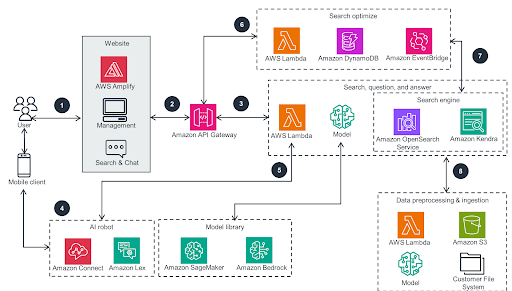Unlocking Organizational Efficiency: How Knowledge Repositories and Intelligence Hubs Drive Success

In today’s fast-paced digital economy, data-driven decisions are critical to maintaining a competitive edge. Enterprises are flooded with vast volumes of data scattered across departments, systems, and formats. Amidst this chaos, the ability to effectively manage, retrieve, and utilize organizational knowledge becomes a decisive factor in operational success.
Solutions such as a search optimized enterprise knowledge repository and a well-structured center of intelligence offer organizations the tools they need to streamline data access, enhance collaboration, and empower informed decision-making.
What is a Knowledge Repository?
A knowledge repository is a centralized digital platform designed to capture, store, organize, and retrieve information that is valuable to an organization. Think of it as a digital brain of the enterprise, where every piece of data — from project documents and reports to internal communications and best practices — is cataloged for easy access and reuse.
These systems not only make data retrieval efficient but also ensure that critical information does not get lost during employee transitions or project changes.
The Role of Search Optimization in Knowledge Repositories
Traditional document management systems often fail when it comes to finding specific pieces of information quickly. A search optimized enterprise knowledge repository is specifically designed to overcome this limitation. It uses advanced indexing, AI-powered tagging, and intelligent metadata assignment to enhance searchability.
With this capability, employees can spend less time hunting for data and more time using it productively. The benefits of a search-optimized system include:
- Faster Decision-Making: Quick access to accurate information supports faster, better-informed decisions.
- Reduced Redundancy: Employees can avoid duplicating work because existing knowledge is easily discoverable.
- Improved Onboarding: New hires gain access to institutional knowledge, accelerating their learning curve.
Introducing the Center of Intelligence
While a knowledge repository focuses on storage and retrieval, a center of intelligence takes things a step further. It acts as an operational command hub, integrating insights from multiple data sources and transforming raw data into actionable intelligence.
This approach empowers organizations to:
- Monitor performance in real-time.
- Gain deep visibility into operations.
- Generate strategic insights that drive innovation.
The center of intelligence serves not just as a passive database but as an active enabler of strategy execution, blending analytics, automation, and collaboration tools.
Combining Knowledge Repositories with Intelligence Centers
To truly unlock the potential of enterprise data, organizations should integrate both systems. A knowledge repository provides the structure and accessibility, while the intelligence center drives analytical depth and strategic alignment. Together, they offer a comprehensive approach to data-driven management.
Key benefits of this integration include:
- Holistic Insight: Unified platforms enable both granular and big-picture understanding.
- Data Democratization: Employees at all levels can access and act on relevant insights.
- Increased Agility: Organizations can adapt quickly to market changes with real-time intelligence.
Best Practices for Building an Intelligent Knowledge Ecosystem
Creating an effective knowledge and intelligence ecosystem requires careful planning and ongoing management. Here are some best practices to ensure success:
1. Start with Clear Objectives
Define what you want to achieve with your repository and intelligence center. Whether it’s reducing time to insight, improving collaboration, or enhancing compliance, having clear goals helps tailor the system to your needs.
2. Leverage AI and Machine Learning
Modern knowledge repositories should incorporate AI to automatically tag documents, recommend content, and surface insights based on user behavior and context.
3. Ensure Data Governance and Security
Sensitive data must be handled with care. Implement role-based access controls, encryption, and regular audits to maintain the integrity and security of your knowledge ecosystem.
4. Promote a Knowledge-Sharing Culture
Technology is only as effective as its users. Encourage teams to contribute to and utilize the knowledge repository regularly. Recognition programs and incentives can reinforce this behavior.
5. Maintain and Update Content
Stale or outdated information can undermine trust in the system. Assign responsibility for regularly reviewing and updating content to ensure continued relevance.
Use Cases Across Industries
Many industries stand to benefit from implementing a combined knowledge repository and intelligence center:
- Healthcare: Doctors and researchers can access clinical trials, medical literature, and patient records in one platform, accelerating diagnosis and treatment decisions.
- Finance: Real-time market data, compliance regulations, and investment strategies are integrated for quick analysis and execution.
- Manufacturing: Maintenance logs, process documentation, and supply chain data are centralized for improved operational efficiency.
- Education: Learning institutions can centralize curriculum content, student data, and research for personalized learning and administration.
Measuring Success
To ensure your knowledge systems are driving value, consider the following metrics:
- User Engagement: Monitor login frequency, search activity, and document contributions.
- Search Effectiveness: Track how quickly users find what they need and whether search queries are successful.
- Business Outcomes: Evaluate improvements in decision speed, productivity, and innovation resulting from better data access.
The Future of Knowledge Management
As organizations continue to embrace digital transformation, knowledge and intelligence systems will become foundational tools for success. The convergence of AI, cloud computing, and data analytics is reshaping how enterprises store, retrieve, and act on information.
Forward-looking companies will increasingly rely on these platforms to gain competitive advantages, foster innovation, and build resilient, knowledge-powered cultures.
Final Thoughts
The complexity of modern business demands more than just data — it requires insight, speed, and precision. By investing in tools like a search optimized enterprise knowledge repository and a center of intelligence, companies can equip themselves to meet these demands head-on. When implemented strategically, these systems transform raw data into a strategic asset that fuels smarter, faster decisions.
Unlocking organizational intelligence isn’t just a technology challenge — it’s a business imperative.



